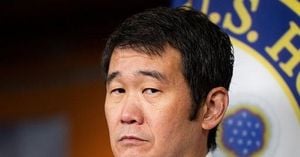The recent nomination of Robert F. Kennedy Jr., known for his controversial views on vaccines, as the U.S. Secretary of Health and Human Services by President Donald Trump has stirred significant turmoil within the pharmaceutical sector. Investor reactions have materialized rapidly, with substantial drops noted across various pharmaceutical companies, igniting discussions about the potential ramifications of such leadership on health policy and corporate strategies.
Shares for major vaccine manufacturers including Pfizer, Moderna, AstraZeneca, and GSK witnessed marked declines soon after the announcement. For example, Pfizer’s stock fell over 4%, and Moderna’s plummeted approximately 7%. This upheaval has raised alarm bells among investors, as Russ Mould, investment director at AJ Bell, commented on the uncertainty surrounding the sector following Trump’s choice. He stated, "The impact on the sector is hard to judge fully at this stage but, at the very least, it will cause a good deal of uncertainty," indicating widespread concern among shareholders.
Kennedy’s reputation as a vaccine skeptic complicates his prospective role overseeing public health initiatives. Known for promoting assertions linking vaccines to various adverse health effects, including autism, he has previously stated, "There’s no vaccine that's safe and effective." His position and pledges, if enacted, could potentially alter the regulatory environment for pharmaceutical companies significantly, moving away from the more supportive stance seen during prior administrations.
This potential shift becomes particularly pertinent when considered alongside the backdrop of Trump's previous administration, which was criticized for its laissez-faire approach to the pharmaceutical industry but also favored the rapid development of COVID-19 vaccines. Analysts now speculate whether Kennedy's nomination could lead to stricter regulations aimed at pharmaceutical companies, particularly those producing vaccines, contributing to the continued volatility within the biotechnology and pharmaceutical sectors.
Paul Chaplin, CEO of Bavarian Nordic, expressed similar sentiments about the uncertainty swirling within the industry. Despite anticipating changes and challenges, he noted the overarching anxiety among investors. He highlighted the precariousness of relying on speculative futures, asserting, "It is too early to say and we have to wait and see how things develop," thereby emphasizing the indecisiveness surrounding Kennedy's anticipated impact on health policy.
Across Europe, stock performances mirrored those observed in the U.S. for similar companies, with Danish-listed shares of Novo Nordisk dipping more than 5%. France's Sanofi, another key player noted for its flu vaccine advancements, also fell roughly 3%. These reactions underline how Kennedy's potential leadership at the Department of Health and Human Services might set off ripples beyond U.S. borders, affecting global vaccine and healthcare stocks.
Kennedy’s previous campaigning has showcased his positions against numerous aspects of modern health practices, often taking aim at the powerful pharmaceutical lobby, affectionately termed 'Big Pharma.' His proposal to crack down on the pharmaceutical industry speaks to the concerns many hold about the balance of power between health regulations and corporate interests. Committed to transparency, he has proposed initiatives demanding drug companies disclose more information about vaccines and has supported limitations on chemical additives within food systems.
Should Kennedy's nomination be confirmed, it would not just signal a change from the Biden administration's policies but from Trump’s earlier tenure, which largely sought to facilitate and fund vaccine development. During Trump’s first term, there was significant investment poured back to pharmaceutical companies to hasten vaccine production. Many wonder if Kennedy's ideology will reflect his prior pandemic responses or usher in apprehension among pharmaceutical sectors.
Critically, Kennedy also runs the nonprofit Children's Health Defense, which campaigns primarily against vaccination mandates and what he deems unsafe medical interventions. His association with various conspiracy theories, including the claim attributing the COVID-19 pandemic to ethnic targeting, places him at the polarizing center of health discourse. Such elements, combined with his outspoken nature, render Kennedy's possible policies hard to predict and highly contested.
While some industry leaders express concern, others see potential areas of opportunity for specific sectors, especially those aligned with Kennedy’s vision for health policy reforms. For example, the chief executive of Bavarian Nordic suggested this could lead to growth for some of their vaccine lines focused on more traditional diseases rather than those against mass immunization programs. This dual nature of apprehension and potential is pivotal as the industry braces for what may lie ahead with Kennedy as Health Secretary.
The pharmaceutical industry's decline echoes broader economic sentiments of uncertainty within U.S. politics as Trump builds his cabinet. With upcoming Senate confirmation hearings for Kennedy, investors and stakeholders alike will be watching closely. Will Kennedy’s tenure be one shaped by skepticism of modern medicine or will it yield increased safety standards and encourage transparency within the industry? For now, what’s clear is the tension mounts as pharmaceutical stocks slid, reflecting fears of what might come next under Kennedy's leadership.
Given the rapid retraction of shares, discussions around what specific policies Kennedy might activate are inevitable and have escalated sharply among financial analysts seeking clarity amid the ambiguity. Kennedy's historical perspectives and assertiveness might take the Department of Health and Human Services down uncharted paths, compelling investors to navigate uncertain waters moving forward.
Widely viewed as one of America’s most audacious public health critics, RFK Jr.’s nomination could have far-reaching impacts not just for vaccine policies but the overall framework of public health regulation, as discussions intensify about the balance between necessary pharmaceutical regulations and corporate interests. With each day and every stock market fluctuation, the narrative surrounding Kennedy continues to evolve—a saga of intrigue, investor caution, and the ever-changing arena of public health policy.
How this all pans out remains to be seen; all stakeholders now engage with bated breath, waiting to decipher the true intentions behind Kennedy's nomination and his envisioned future for U.S. health care. Whatever direction this takes, one thing is certain— the stakes are higher than ever, as the public and investors alike navigate through the complex interplay of politics, health, and financial markets.



